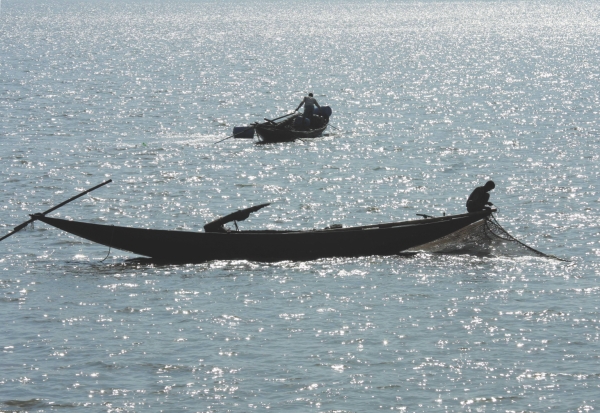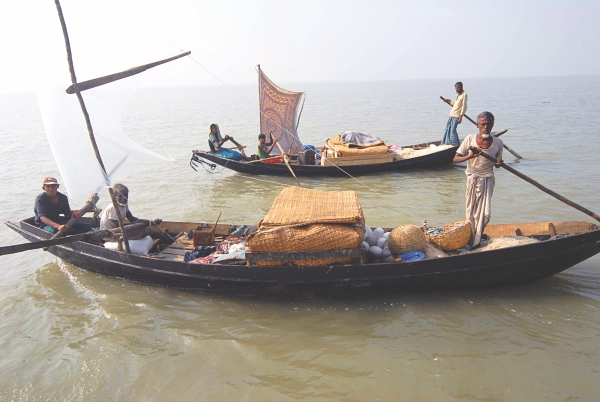| Home - Back Issues - The Team - Contact Us |
 |
| Volume 11 |Issue 43| November 02, 2012 | |
|
|
Reflections
THE LOST WANDERER Morshed Ali Khan When Mallik woke up in the middle of the night, the entire village was asleep. The crickets in the nearby bushes chirped ceaselessly. Mallik crept out of the rickety bed and in the dark looked for his slippers on the earthen floor. A faint noise coming from inside the main sleeping quarters of the thatched house drew Mallik's attention but he ignored it. Mallik is a stranger to the Romonpur village. The river Choto Padda, a tributary to the mighty Padma ten kilometres away winds its way through the village. Lush green fields and thick vegetation adorn the tranquil atmosphere. In the morning hours, village women flock to the ghat to do the day's washing and bathing. Children climb a tree by the river and take great pleasure in diving into the water below. With his frail body, tired eyes, dirty clothing and a ragged cloth bag hanging from his shoulder, Mallik, looked like a weary wanderer. He sat under a banyan tree near the ghat when Arjunmajhi, the middle-aged boatman of the near deserted ghat approached him for fire. “I don't smoke,” said Mallik looking blankly at Arjunmajhi. Mallik kept quiet, looking at the stretch of water before him as if his vision was watching a movie unfolded by his memory of a terrible past. “Where do you come from?” asked the boatman as he stepped a few feet away from Mallik waylaying a passer-by for fire. Arjunmajhi sat down by the wanderer. “In winter there is almost no income for us, there is hardly any traveller passing through Romonpur,” he said trying to draw the stranger into a conversation, “Bhai, you look fatigued, where do you want to go?” Mallik did not answer the boatman. He kept gazing at the river. Suddenly two drops of tears rolled down Mallik's face and fell onto his dry hands. Arjunmajhi, drawing a deep puff from his bidi was puzzled. The boatman's own life had not been all smiles. With his meagre income he struggled to feed his wife, Kharjana and a twelve-year old daughter Parani. In winter, there are days when Arjunmajhi's family go hungry and Arjunmajhi seeks other jobs in the village to sustain. Despite the hardship, tears of the elderly stranger, who he had met minutes ago, touched Arjunmajhi profoundly. “I have been walking across the countries for a long time,” suddenly Mallik said, “I am too tired my son.” “I once had a family and a piece of land with cows and goats and a tin-shed home in a village far away from here,” sighed Mallik, “I have nothing but memories.” Arjunmajhi listened to Mallik's story until a group of singers arrived at the ghat seeking to cross the river. “Don't go away, Mallik bhai, I shall be back soon,” Arjun left to do his job. Mallik's story goes back exactly two years from now at a village near Mymensingh. Mallik, a village goldsmith lived happily with his wife and two daughters. The only surviving relative of Mallik, outside his family, was his brother-in-law Emon, who, having graduated from Dhaka University, returned to his sister's house. Soon, Emon became the centre of attention for the parents trying to find a groom for their daughters. And Emon was a promising one. Soon it was all arranged. Emon was to be tied to a beautiful girl 30 kilometres away from the village.
On the day of the marriage the bridal party, Emon, Mallik's wife and his two daughters and seven of their neighbours — a total of eleven people — packed into a rented microbus, hastily decorated with colourful papers. Mallik, having found no seat on the micro, chose to take the bus. After Mallik arrived at the bride's house he was told of the tragedy that changed his life entirely. All the people, including the driver of the micro were mowed down and killed by a reckless bus, ten minutes away from the destination. “I have, ever since, decided to live like a wanderer with the memories. I sold my land and livestock and gave the money to a charity. And this is for the first time I am narrating my story to someone.” Arjunmajhi grabbed Mallik by his hand and asked him to accept his invitation to his house. Mallik hesitated but gave in to Anjhumajhi's persistence. It was a dark night. Mallik slowly slipped outside. A cold air embraced him. He could still hear a faint female voice from inside Arjunmajhi's house. Mallik chose a bushy corner at the edge of the thatched house to relieve himself. Mallik could not see a thing. Suddenly a sharp hiss chilled his bones. He remained immobile. The second hiss was so near that Mallik could not help himself. He tried to get away. Just then, it struck on his left foot. An excruciating pain ran through his body. Before he could cry for help, the beast struck again, now on his right foot. Within minutes Mallik fell to the ground, silent. Arjunmajhi and his wife Kharjana woke at dawn, two hours later. Arjunmajhi was surprised not finding Mallik in bed. It was Kharjana, who made the tragic discovery. She yelled with all her force. There on the ground at the edge of Arjunmajhi's house lay the lifeless body of Mallik. Villagers gathered and soon found the distinct marks of two snakebites. Many of the villagers were surprised because in winter snakes hardly surface from their hibernation. The villagers could not recall anyone dying of snakebites in the village in the past. Where is the snake now? Could it strike again? Villagers searched the area thoroughly but found no trace of it. The chairmen and the village chowkidar (village police) arrived at Arjunmajhi's house, which was now thronged by scores of villagers. Everyone in the village liked Arjunmajhi, a simple hard working man not meddling in anybody else's affairs. The chowkidar and the chairman listened to Arjunmajhi and thoroughly checked the bite marks. “You have to take the body to the hospital and get a death certificate, mentioning the possible cause of death,” said the chairman to the chowkidar. “Only then shall we organise a proper burial for this stranger.” Arjunmajhi sat on the floor nearby, mystified. I have known this strange soul and liked him so much. I did not even ask him about what religious faith he belonged to and now I do not know how we can think of a proper burial, he thought. As Mallik's body was returned from the hospital, the chairman and the imam of the local mosque summoned Arjunmajhi. “Is Mallik a Hindu or a Muslim?” asked the imam. “I do not know. I never asked him.” The village was in turmoil. Some suggested checking his genitals to determine his religious faith, some demanded a cremation and some insisted on a burial. As the mullahs and Hindu priests dwelt over how to organise a funeral, Arjunmajhi slowly stood up, his eyes fixed and jaws clutched. “He is my friend who died in my house,” said Arjunmajhi firmly, “I shall decide what to do.” Villagers looked on as Arjunmajhi chopped down a dozen banana trees and made a solid raft. Few young men came forward to help Arjunmajhi. The body was washed and placed on the raft. Arjunmajhi covered the body with an old piece of cloth and placed all Mallik's belongings beside him before pushing the raft out into the river. The current slowly steered the funeral raft toward the river Padma. The western sky lit up with the setting sun. |
|
|

